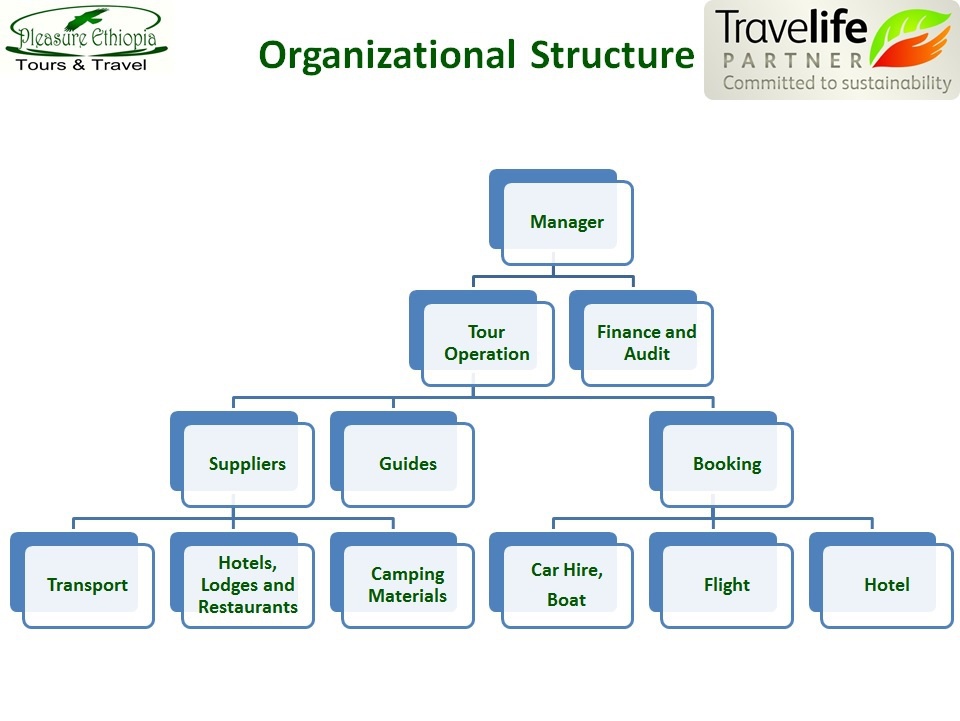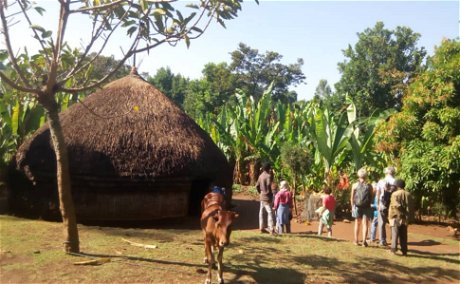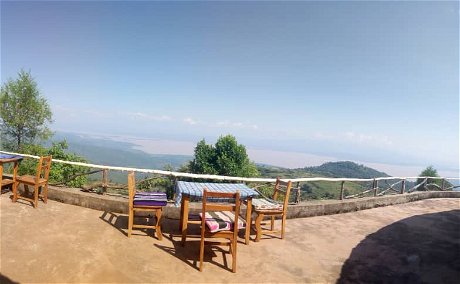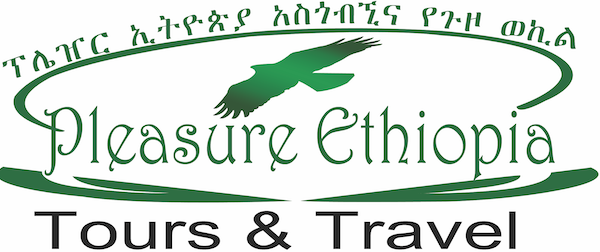Our Sustainability Policy
Tourism undoubtedly brings economic progress to our country. At the same time, it can endanger our fragile nature and indigenous cultures. We are convinced that the right balance between people, planet and profit is ultimately the right path to sustainable development. That is why we train our employees in this, promote our business model with our suppliers and transfer our knowledge to the local population. Because we feel responsible - not only think but also act - we have developed our Sustainability Policy together with Travelife.
Internal Communication
In our communication, we commit to respectfully address and practice the principles of the following social matters and human rights clearly:
- Allowing employees to be members of trade unions, or any other associations
- Allowing employees’ freedom of movement to leave work and terminate their contract informing them one month in advance
- Give a letter of appointment with a job description to an employee upon employment
- Pay standard salary to the position appointed
- Give appropriate compensation for overtime work done
- Subsidize certain medical expenses of employees humanly
- Give employees sick leave and fixed paid annual leave
- Comply with the national labor law on child labor
- Grant employees ways to breathe their grievances and satisfaction
- Treat all candidates equally regardless of their origin, gender, marital status, religion, political views upon recruitment
- Encourage candidates with special needs
- Give equal opportunity to all employees for any training, capacity building
- Grant appropriate maternity leave, if any, for employees pre and post-pregnancy
Office operations:
- Switch off the lights during the day and use it only when needed
- Switch off power switches out of working hours
- Try to use natural light that comes through the window
- Print documents if and only if necessary
- If there are papers not usable but printed on one side, cut into 4 pieces and use them as a notebook.
- Use refilling ink for the printer instead of buying the whole new one.
- It’s not mandatory for the guide to come to the office unless it is a must.
- The guide is free to work as a freelance so long as there is no field activity in the company or doesn’t clash
- with the existing ones.
- Purchase any equipment that is durable with low energy consumption and lesser environmental impact.
- Use water reasonably and fairly at all times.
- View our HR Policy
In the field:
- Guides accompanying guests from the arrival should allow local assistants (guides) at each destination to play a role as well as share experiences. Because engaging them creates a sense of belongingness and adds value to the future conservation of the attraction sites or tourism products.
- Drivers, in the park, should be aware that honking disturbs the habitats and is restricted and when stopping to see a bird or other animals, the engine needs to be turned off.
- When visiting attraction sites, community villages, and attending local events; the guide is expected to aware guests to abide by the rules and regulations of the host. This helps retain the indigenous culture and respect the community cultural values that are among the primary focus. Besides, guests need to be aware of these values in advance in order to avoid or minimize any culture shock or unnecessary occurrences. This applies to all the sites they visit.
- Guests are advised to have their own personal water bottles, if possible stainless steel or insulated and collapsible ones, to minimize wastage of water and avoid using plastic bottles.
Logistics:
- Cars to be used must be well serviced to keep not only the comfort of the guests but also minimize the pollution impact on the environment
- The horse or Mule tier needs to be at working age and not too young to work.
- For the camping, foodstuffs purchased are to be packed in cartons and not plastic bags. Since all items cannot be purchased from one place, we ensure the local community is thought in the chain, allowing them to render services and/or sell some products.
- Excursions and other areas include visiting indigenous people, animal activities, visiting protected areas, and cultural heritage and must be handled with due care and caution.
Conservation
We commit to practice any sustainability-related activities and play our part with our capacity for any call related to conservation and for these we are also members of the following associations:
- Ethiopian Heritage Trust Association (EHTA)
- Talak Ethiopian Tour Operators Association (TETOA)
- Addis Ababa Chamber of Commerce and Sectoral Association (AACCSA)
- Ethiopian Tourism Professionals Association (ETPA)
Accommodation
When working with accommodation suppliers, we make sure they follow the following sustainable practices:
- Eliminate or Minimize negative impacts on the environment and society
- Use renewable energy or have a way of using energy-efficient appliances and equipment
- Use water conservation
- Have a sustainable waste management plan
- Work on Capacity building of its Human Resources
- Follow fair business rules set by the law
- Don’t use boys and girls for sexual exploitation
- Don’t use underage children for work
Excursions and other activities
During excursions, be it a day or in the middle of the tour, certain major elements of sustainability are addressed to our clients such as
- Follow trails dedicated to the activity
- Engage with local/host communities respectfully
- Respect the site/destination
- Follow the rules and regulations
- Do not disturb the eco-system
- Discourage visiting captive animals
- Discourage engaging in wildlife harvesting
- Support environmental and biodiversity protection
External Communications
We commit to practicing communication with the customers and other local partners such as hotels and restaurants, guides, road leaders, and other assistants at destinations in a sustainable manner
- Inform/advise customers of our sustainable practices, rules, and regulations for destinations
- Advise customers of the dos and don’ts of excursion and/or other activities
- Be transparent in our pricing so that no surprises await at the beginning of the tours
- Inform our different partners about the services required such as hotel accommodation, camping areas, and local assistants for any ritual celebrations at destinations
PETT Organizational Structure

Accommodation Requirement

Accommodation Policy
Our company is committed to promoting sustainable accommodation.
In order to work closely with our accommodation suppliers, a sustainability policy is a must to have. With these, both of us, our company, and our accommodation suppliers benefit from the sustainable practices along the value chain whereby they will be chosen for our clients. The policy is designed based on the following sustainable accommodation principles that the establishment is least expected to follow:
1. Reasonable price
The price set needs to be fair with what it offers. Above all, the cleanliness and hygienic parts of its services with sustainable practices.
2. Eliminate or Minimize negative impact on the environment and society
It gives high priority to sustainable practices, aiming at eliminating (if possible) or minimizing the negative impacts on the surrounding environment and society.
3. Work on Capacity building of its Human Resources
It creates an enabling environment for its human resources and also works well in training the staff through different methods such as on-the-job training, exposure visits, experience sharing with senior experts, etc.
4. Fair business
It follows fair business practices such as transparency and compliance with rules and requirements set by the law, the rights of its employees in particular and humans as a whole, economic/social equity, and concern for the flora and fauna of the environment.
5. Child Labour
The business does not contract directly or indirectly accommodations that are involved in compulsory labor or employ children to complete work that is normally undertaken by adults. There are special working times and conditions for children (< 14 years) working within the business, under the UN Convention on the Rights of the Child and/or the ILO Convention 138. The condition is mentioned in the contract with the accommodation.
6. Sexual Exploitation
Hotels and B&Bs are in a unique position to help because evidence shows that B&Bs and hotels are often used as locations to meet, groom, and abuse children (both girls and boys). Girls and boys, from any culture, ethnicity, religion, or background, under the age of 18 who are coerced or forced into a sexual relationship or situation by another person. It often involves young people being offered something in return for performing sexual acts, for example: • Alcohol • Cigarettes • Mobile Phones • Gifts • Money • Drugs • Love

Sustainable Accommodation Requirement
Our company is committed to promoting sustainable accommodation.
The main purpose we require the practice of sustainable accommodation is to minimize environmental impact through green best practices in maintenance, services, logistics, products, and supplies. The core elements of sustainability revolve around reducing waste, saving energy, and cutting down on water usage.
Hence, we anticipate the accommodation establishments to practice/follow some (if not all) of the following measurable sustainable practices:
Energy Conservation
- Implementing renewable energy programs (i.e., solar and wind power)
- Installing energy-efficient appliances and equipment
- Controlling guestroom energy consumption by using digital thermostats
- Use of energy star-qualified products
- Installation of motion sensors that automatically turn lights off in low-traffic areas
- Installation of reflective glass or triple-glazed windows
- Using energy-efficient light bulbs (LED)
- Depending on daylight rather than artificial light when cleaning vacant dirty rooms
Water Conservation
- Installing water-efficient devices and appliances (e.g., using low-flow toilets and showerheads and installing infrared-activated faucets)
- Implementing towel/bed linen reuse programs
- Fixing leaks in toilets and baths regularly
- Watering grass and plants early in the morning and late at night to limit evaporation
- Recycling the grey water (water from washing vegetables and fruits) for grass irrigation and monitoring the water consumption in each department to track usage
Waste Management Usage
- Separating hotel wastes by using clearly labeled containers and colored bins for collecting recyclables
- Purchasing products containing recycled content
- Collecting organic kitchen wastes separately for soil composting
- Purchasing food items and cleaning chemicals in bulk
- Adopting a donation program (donating food leftovers and linens to charity)
- Grinding the remaining guest soaps to use as laundry detergent
Social Sustainability Practices
- Respect human right
- Treating Labour fairly
- Stand against child labor
- Condemn sexual exploitation
- Rejecting corruption/ bribery
- Paying fair wage for living
- Caring for their living conditions, health, safety, and wellness
- Treating all employees equally regardless of their age, gender, nationality, ethnicity, ideology, religion, etc
- Allowing fair work-life balance
- Support capacity building, empowerment, community engagement, philanthropy, volunteerism
- Protecting the biodiversity
- Protecting cultural norms and values from negative influence
- Participating in the conservation of heritages
Since, we follow a long-term strategy, additional self-evaluation of our chosen accommodation establishments' practices might be needed either by discussing to the responsible person or through our guides’ report. This helps us to recommend their facilities and practices to our clients. Besides this, we may share the:
- Information about hotel certification, such as Travelife for Hotels
- Self-evaluation tools
- Training manuals to the Travelife for Hotels
Sanctions
Failure to perform the basic sustainable practices may result in receiving a warning to amend/improve its weaknesses and may end up in the final termination of our collaboration.



Share This Page